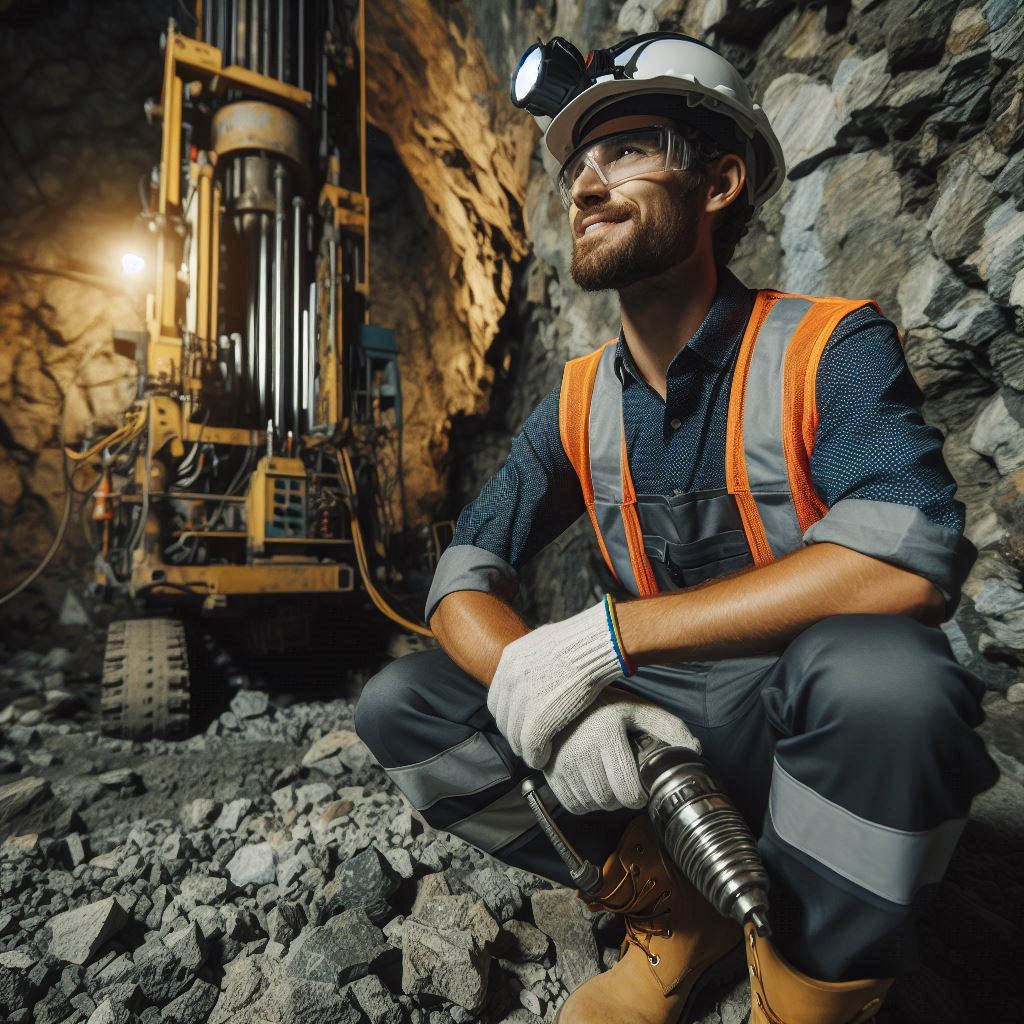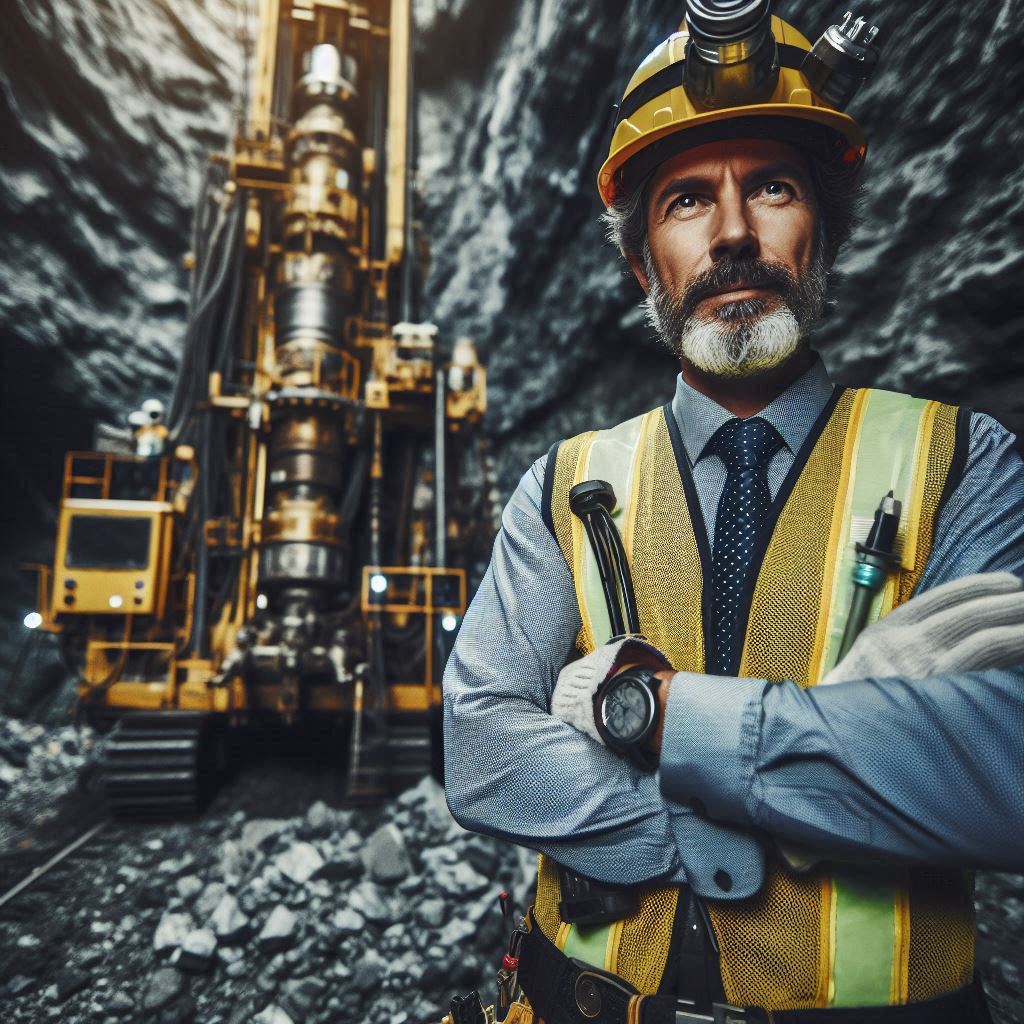Introduction
Mining engineers play a crucial role in the exploration process for Mining Engineer in Exploration.
They help locate and assess mineral resources essential for various industries.
Their expertise ensures efficient and sustainable extraction, which is vital for economic growth and technological advancement.
Mining engineers start with geological surveys to identify potential mining sites.
They analyze geological data and assess the viability of these sites.
They use advanced tools and techniques to gather accurate data.
This data helps in determining the quality and quantity of the mineral deposits.
Once they identify a promising site, mining engineers plan the exploration process.
They design and oversee drilling operations to extract core samples.
These samples provide detailed information about the mineral composition and structure of the deposit.
Engineers then analyze these samples to estimate the deposit’s value.
Mining engineers also ensure compliance with environmental and safety regulations.
They conduct risk assessments and develop strategies to minimize environmental impact.
Safety is a top priority, and they implement measures to protect workers and the surrounding communities.
Additionally, mining engineers manage budgets and resources for exploration projects.
They work closely with geologists, environmental scientists, and other stakeholders.
Their collaboration ensures the project stays on track and within budget.
In summary, mining engineers are essential in the exploration phase.
They identify, assess, and plan the extraction of mineral resources.
Their expertise ensures that exploration is efficient, safe, and environmentally responsible.
Understanding their role highlights the importance of mining engineers in the broader context of resource development and sustainability.
Qualifications of a Mining Engineer
Educational Background Required to Become a Mining Engineer
Becoming a mining engineer requires a strong educational foundation.
Aspiring engineers must earn a bachelor’s degree in mining engineering or a related field.
Accredited programs provide essential knowledge in geology, mine design, and mineral processing.
Courses in mathematics, physics, and chemistry are fundamental.
These subjects build the analytical skills needed in mining engineering.
Practical experience through internships is highly valued.
It allows students to apply theoretical knowledge in real-world settings.
Some positions may require advanced degrees.
A master’s or PhD can open opportunities in research and specialized roles.
Skills Necessary for Success in the Field
Mining engineers need a diverse skill set.
Problem-solving abilities are crucial for tackling complex challenges.
Engineers must analyze data and develop efficient mining methods.
Strong communication skills are essential.
Engineers work with various teams, including geologists and construction workers.
They must convey technical information clearly.
Project management skills are also vital.
Engineers often oversee large-scale projects and must manage time, resources, and personnel effectively.
Technical skills in computer-aided design (CAD) and geographic information systems (GIS) are increasingly important.
These tools help in designing and planning mining operations.
Importance of Continuing Education and Certifications
Continuing education is crucial for mining engineers.
The field is constantly evolving with new technologies and methods.
Staying updated ensures engineers remain competitive and effective.
Professional certifications enhance credibility and job prospects.
Organizations like the Society for Mining, Metallurgy, and Exploration (SME) offer valuable certifications.
These credentials demonstrate expertise and commitment to the field.
Continuing education courses provide opportunities to learn about the latest advancements.
Engineers can specialize in areas like environmental management or mine safety.
Attending conferences and workshops is beneficial.
These events offer networking opportunities and exposure to industry innovations.
Read: Exploring Subfields of Aerospace Engineering
Exploration Planning
Role of Mining Engineers in Designing Exploration Plans
Mining engineers play a crucial role in designing exploration plans.
They assess potential sites and determine the feasibility of mining operations.
They consider various factors like mineral availability, environmental impact, and economic viability.
Their expertise ensures that exploration plans are efficient and effective.
Collaborating with Geologists and Other Professionals to Determine Target Areas
Mining engineers collaborate closely with geologists to identify target areas.
Geologists provide critical data about the earth‘s composition and mineral deposits.
Together, they analyze this information to pinpoint promising sites.
Engineers also work with environmental scientists and surveyors to understand the terrain.
This multidisciplinary approach ensures comprehensive and accurate exploration plans.
Utilizing Advanced Technology for Data Analysis and Mapping
Advanced technology is vital for modern mining exploration.
Mining engineers use sophisticated software for data analysis and mapping.
These tools help in visualizing underground mineral deposits and assessing site potential.
Geographic Information Systems (GIS) provide detailed maps and spatial analysis.
Remote sensing technology offers insights into inaccessible areas.
Read: The Impact of Aerospace Engineering on Modern Life
Site Assessment
During the exploration phase of a mining project, the role of a mining engineer is crucial in conducting site assessments.
This process involves a series of tasks aimed at evaluating the feasibility of mining in a particular location.
Conducting feasibility studies of potential mining sites
One of the key responsibilities of a mining engineer in exploration is to conduct thorough feasibility studies of potential mining sites.
This involves assessing various factors such as access to infrastructure, availability of resources, and potential environmental impacts.
The mining engineer will analyze the geographical and topographical features of the site to determine the suitability for mining operations.
Factors such as terrain, soil composition, and proximity to water sources are taken into consideration during this assessment.
Identifying environmental and safety considerations
Another important aspect of site assessment is identifying environmental and safety considerations.
The mining engineer must evaluate the potential impact of mining activities on the surrounding environment and implement strategies to mitigate any negative effects.
Ensuring the safety of workers and local communities is also a priority during this phase.
The mining engineer will assess potential hazards such as unstable ground conditions, presence of toxic substances, and risks of accidents to develop comprehensive safety protocols.
Analyzing geological data to determine resource potential
One of the key skills of a mining engineer is the ability to analyze geological data to determine the resource potential of a mining site.
This involves studying the composition and structure of rock formations to identify valuable minerals.
The mining engineer will interpret data from geological surveys, core samples, and geophysical studies to estimate the quantity and quality of resources available at the site.
This information is crucial for making informed decisions about the economic viability of mining operations.
Read: Essential Aerospace Engineering Textbooks

Permitting and Regulatory Compliance
Ensuring Compliance with Local, State, and Federal Regulations
Mining engineers play a critical role in ensuring compliance with regulations.
They must stay updated on local, state, and federal laws.
These regulations govern various aspects of mining operations.
Engineers ensure that exploration activities adhere to legal requirements.
Compliance helps avoid legal issues and fines.
Securing Necessary Permits for Exploration Activities
Mining engineers are responsible for securing permits.
Permits are essential for legal exploration activities.
Engineers must navigate complex permitting processes.
This involves submitting detailed plans and reports.
They work closely with regulatory agencies.
Securing permits ensures that exploration can proceed legally.
Addressing Environmental Concerns and Implementing Sustainable Practices
Addressing environmental concerns is crucial for mining engineers.
They assess the potential impact of exploration activities.
Engineers design plans to minimize environmental damage.
Implementing sustainable practices is a priority.
This includes using eco-friendly technologies and methods.
Sustainable practices help protect ecosystems and local communities.
Mining engineers must also conduct environmental impact assessments.
These assessments identify potential risks.
Engineers develop strategies to mitigate these risks.
They monitor exploration activities to ensure compliance with environmental standards.
Ongoing monitoring helps detect and address any issues promptly.
Read: Aerospace Engineering in Commercial Spaceflight
Exploration Drilling
Overseeing Drilling Operations to Extract Core Samples
Mining engineers oversee drilling operations to extract core samples from the earth.
They ensure that drilling is conducted efficiently and safely.
Proper drilling techniques are crucial for obtaining high-quality core samples.
Engineers monitor the equipment to prevent malfunctions and ensure the integrity of samples.
Their role is vital for collecting accurate geological data.
Analyzing Rock and Soil Samples to Determine Resource Quality
Once core samples are collected, mining engineers analyze rock and soil samples.
This analysis determines the presence and concentration of valuable resources.
Engineers use various methods, such as chemical assays and physical tests, to assess sample quality.
Understanding the mineral composition and ore grade is essential for evaluating resource potential.
Transform Your Career Today
Unlock a personalized career strategy that drives real results. Get tailored advice and a roadmap designed just for you.
Start NowInterpreting Data to Assess Economic Viability of Mining Sites
Interpreting data from rock and soil samples is crucial for assessing mining site viability.
Engineers evaluate the data to determine the economic feasibility of mining operations.
They consider factors such as ore grade, extraction costs, and market conditions.
This analysis helps in forecasting potential revenue and making informed decisions about site development.
Mining engineers play a critical role in exploration by overseeing drilling, analyzing samples, and interpreting data.
Their expertise ensures that resources are extracted efficiently and economically, contributing to successful mining projects.
Risk Assessment
Identifying and Mitigating Potential Risks
Mining engineers are tasked with identifying potential risks that may arise during exploration activities.
These risks could range from geological hazards to safety concerns for the workers on site.
By conducting thorough risk assessments, mining engineers can develop strategies to mitigate these risks and ensure the safety of all personnel involved in the exploration process.
Developing Contingency Plans
In addition to identifying risks, mining engineers must also develop contingency plans to address unexpected challenges that may arise during exploration.
These contingency plans are essential for ensuring that the operation can continue smoothly in the event of unforeseen circumstances, such as equipment failure or adverse weather conditions.
Prioritizing Workplace Safety and Environmental Protection
One of the primary responsibilities of a mining engineer in exploration is to prioritize workplace safety and environmental protection.
Ensuring that all workers adhere to safety protocols and that environmental regulations are followed is crucial in minimizing the impact of exploration activities on the surrounding ecosystem.
Overall, risk assessment is a key aspect of the mining engineer’s role in exploration.
By identifying and mitigating potential risks, developing contingency plans, and prioritizing safety and environmental protection, mining engineers play a vital role in ensuring the success of exploration activities in the mining industry.
Uncover the Details: Popular Computer Engineering Specializations
Discover More: Impact of Cyber Threats on Cybersecurity Analyst Jobs
Collaboration with Stakeholders
Working with Government Agencies, Landowners, and Community Members
Mining engineers play a crucial role in exploration by collaborating with various stakeholders.
They work closely with government agencies to ensure compliance with regulations.
Engineers must secure permits and approvals before beginning exploration activities.
They also engage with landowners to negotiate access and address property concerns. Risk Assessment
Communicating Project Plans and Addressing Concerns
Effective communication is key in these interactions.
Engineers present project plans clearly to stakeholders, explaining potential impacts and benefits.
They address concerns about environmental and social effects transparently.
Open dialogue helps build trust and ensures all parties are informed about project details.
Building Positive Relationships to Promote Responsible Mining Practices
Building positive relationships with community members is essential.
Engineers involve local communities early in the process, listening to their concerns and feedback.
They provide updates on project progress and how it affects the community.
This approach fosters goodwill and demonstrates a commitment to responsible mining practices.
Integration with Mine Development
Transitioning Exploration Findings into Mine Development Plans
Mining engineers play a crucial role in turning exploration data into actionable mine development plans.
After collecting core samples and analyzing data, engineers assess the feasibility of potential mining sites.
They use this information to design detailed plans for mine development.
These plans include determining the optimal mining methods and designing necessary infrastructure.
Effective planning ensures efficient resource extraction and minimizes environmental impact.
Assisting in the Design of Mining Operations and Infrastructure
Mining engineers are vital in designing mining operations and infrastructure.
They develop layouts for mine shafts, tunnels, and surface facilities.
This includes designing support systems, ventilation, and waste management systems.
Engineers also plan for transportation routes to move extracted materials efficiently.
They ensure that all designs comply with safety regulations and industry standards.
Proper design minimizes risks and maximizes operational efficiency.
Providing Ongoing Support to Optimize Production and Resource Recovery
Once mining operations begin, engineers provide ongoing support to optimize production.
They monitor and adjust processes to enhance efficiency and resource recovery.
Engineers analyze data from ongoing operations to identify areas for improvement.
They address challenges such as equipment malfunctions, safety issues, and environmental concerns.
By continually refining processes, engineers help maintain optimal production levels and resource recovery.
Delve into the Subject: Geological and Petroleum Technician Job Descriptions
Conclusion
Mining engineers play a vital role in the exploration phase of mining projects.
They identify potential mining sites, assess their viability, and ensure efficient resource extraction.
Their work begins with geological surveys and ends with detailed feasibility studies, ensuring every project stands on solid ground.
Sustainable practices and social responsibility are crucial in mining exploration.
Mining engineers must balance resource extraction with environmental conservation.
They implement eco-friendly techniques, reduce environmental impacts, and work with local communities.
Their commitment to sustainability ensures the mining industry‘s long-term viability.
Aspiring mining engineers should pursue this rewarding career.
The field offers exciting challenges and opportunities for innovation.
By adopting sustainable practices and prioritizing social responsibility, they can make a significant positive impact.
The mining industry needs skilled professionals who are dedicated to responsible resource management.
Therefore, mining engineers are essential in exploration, driving projects from concept to reality.
Their expertise ensures that resources are extracted efficiently and responsibly.
Emphasizing sustainability and social responsibility, they protect the environment and support local communities.
Aspiring engineers should consider this fulfilling career, where they can contribute to both industry success and environmental stewardship.
The mining industry offers a dynamic and impactful career path for those passionate about engineering and sustainability.
By pursuing a career in mining engineering, you can be at the forefront of resource management and innovation.
Embrace the challenges and rewards that come with this field.
Join the next generation of mining engineers dedicated to responsible and sustainable practices.
Your efforts will shape the future of the mining industry.




